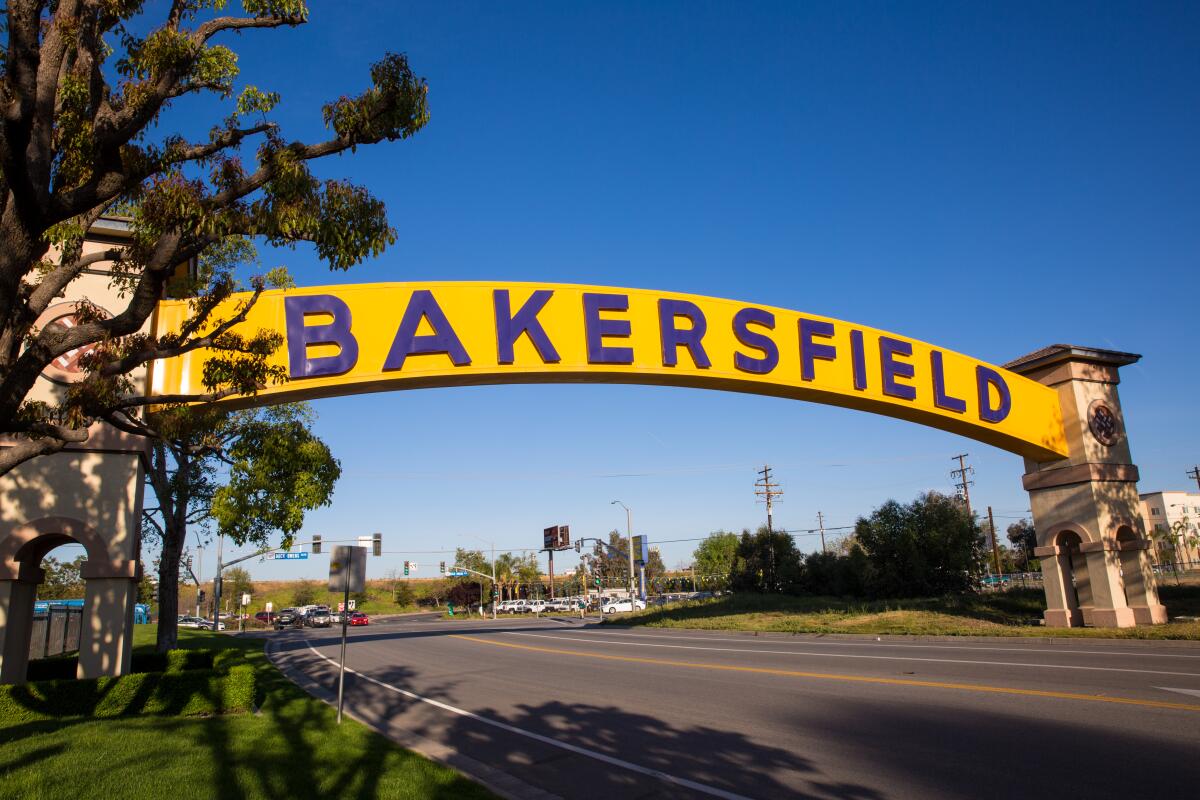Op-Ed: Thinking of moving to Bakersfield? Join us. Just don’t judge us before you get here

- Share via
They come in search of square footage, quick commutes, pellet grills and swimming pools, leaving behind their lives in the big city for Bakersfield, “a California they can afford,” as a recent New York Times headline put it. But as newcomers drive housing prices to historic highs, Bakersfield increasingly is becoming a California those of us who already live here can no longer afford.
Our median household income is woefully low, yet the median home price keeps rising. The rental market is tight, with rents soaring way out of reach of most everyone I know, including my niece, a college lecturer, and her high school teacher husband.
That said, Kern County has been a magnet for seekers and dreamers for generations. For 30 years, they came in droves to Bakersfield by car, by bus, by freight and by foot, mostly from Oklahoma and Arkansas. They were poor, weary and didn’t have a plan so much as a compass direction: Head west. But like my dad always said, they were the ones with gumption — the ones who wanted something better. My grandpa was one of them.
William O. Self left Arkansas in the 1940s for California and the booming war production in Bay Area shipyards. Eventually, he sent for his wife and six children, who boarded a train with their meager belongings and a hamper of fried chicken, which Grandma traded for milk from a soldier so she could feed the baby.
After the war, the family drifted down the state and landed in Bakersfield. Here, in the heartland of California, they found families they recognized. There was plenty of cotton to pick, potatoes to fry and that distinctive “Howdy, y’all” drawl that sounded like home.
That’s how my family got here, but it wasn’t so different for the legions of Mexican and Filipino farmworkers, Basque shepherds, Chinese rail workers and others who, like my grandparents, came in search of one thing: opportunity.
Our economy has always been tied to the earth — the fertile fields that feed the nation and the richest oilfields in California. If you are willing to put your back into it, there is work here; there always has been. And there is hope or, in the words of Central Valley writer Gerald Haslam, if not hope, “the hope of hope.”
And the transplants keep coming, still looking for opportunity. The recent wave of them from Los Angeles and San Francisco often say they are looking to escape the high cost of life in a major city — the too-small apartments, the homes priced out of reach, the long commutes.
Reports on the Bakersfield of today often follow a familiar formula: An outsider comes to town to get a look at one of the most affordable cities in California. They note the basics: the country music, the conservative politics, the oil, the agriculture, the dirty air.
And then they find the transplants. Not those like the family of a Cal State Bakersfield student I recently wrote about in a campus publication — who come here from Mexico and live in a garage for a year until they can find a one-bedroom apartment for a family of seven. They interview new residents giddy over their McMansions and lush lawns.
But the audiences for these stories live outside the city limits, usually outside the Central Valley. There’s often a faint — not that faint, actually — air of condescension threaded throughout.
“Like, who moves to Bakersfield?” That was a recent quote in the New York Times from a lawyer who did just that, leaving the Bay Area for a townhome in the city’s newly fashionable downtown.
No hard feelings. We attract them with our affordability but win them over with our odd contradiction of small-town charm and big-city aspirations. They act as though they’ve discovered a secret, and we let them think they have.
Yet there’s more to Bakersfield, and those of us who have loved/loathed it for generations wrestle with the challenges every day.
We’re one of the poorest cities in California. One in five Bakersfield residents lives in poverty, and the annual median household income of $63,000 is well below the state’s $75,000. The median home price is about 20% higher than it was a year ago — it is hovering around $350,000, a steal in much of California but out of reach for so many families who live here.
The twin pillars of our economy for more than 100 years — oil and agriculture — are undergoing unprecedented upheaval, putting jobs on the line.
Our rates of educational attainment are among the lowest in the state. A recent survey by Wallet Hub called Bakersfield “one of the least educated cities in America,” ranking us 147 out of 150.
And we can’t pin any of that on the newcomers.
In fact, for Bakersfield to once again be the California that all of its residents can afford, we will need all the help we can get.
We have already begun working toward that goal, drawing upon the wisdom and experience of the old guard and the fresh perspectives of an emerging group of civic boosters, many of whom are newcomers.
The agenda is ambitious: better jobs, economic diversity, cleaner air, more high school diplomas and college degrees, greater investment in our downtown and on and on.
In Bakersfield, we are used to working for what we want, and if the past is any indication, we are ready to live up to that ethic.
So welcome, new neighbors.
Now get to work.
Jennifer Self is the public information officer at California State University, Bakersfield. She has lived in Bakersfield her entire life.
More to Read
A cure for the common opinion
Get thought-provoking perspectives with our weekly newsletter.
You may occasionally receive promotional content from the Los Angeles Times.









